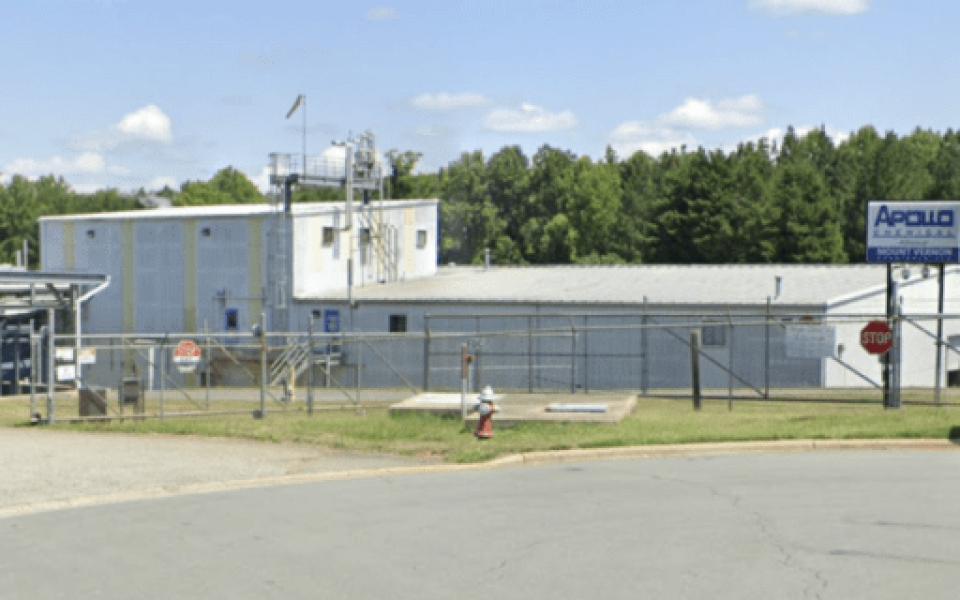Featured photo: Apollo Chemical, 2998 Willow Springs Lane in Burlington, is suspected of discharging toxic 1,4-Dioxane into the City’s treatment plant. This is the second time in seven months Apollo has been responsible for the contamination. (Photo: Google Street view)
This story was originally published by NC Newsline, by Lisa Sorg
This story was updated at 9:45 a.m. on Jan. 25 to reflect public statements from the Town of Pittsboro.
Wastewater leaving a City of Burlington treatment plant contained 545 parts per billion of a likely carcinogen 1,4-Dioxane, a level is more than 1,500 times the target value set by the state for surface water. The slug of the compound is headed downstream in the Haw River to Pittsboro and other communities.
In an email sent at 5:33 p.m., Burlington officials announced that they had received results at 1:30 today showing a spike of the compound in wastewater. It was detected as part of a routine testing protocol developed after an incident last summer. In both cases, Apollo Chemical is the source of the 1,4-Dioxane, according to city officials.
Apollo Chemical supplies industry with flame retardants, stain blockers and lubricants, among other products. It is located in southwest Burlington.
The City has instructed Apollo to immediately cease production and will meet with the company tomorrow, according to the Burlington press release.
Burlington officials say they immediately contacted the N.C. Department of Environmental Quality, as well as downstream water utilities, which could be affected: the Town of Pittsboro, AQUA NC — a major water customer of the town of Pittsboro, the Town of Cary, the Fayetteville Public Works Commission, and the Cape Fear Public Utility Authority. Traditional water and wastewater treatment systems can’t remove 1,4-Dioxane, but both Pittsboro and CFPUA have installed expensive technology to significantly reduce the amount of the compound in the drinking water.
Pittsboro officials issued a press release Thursday morning saying that “out of an abundance of caution, the water plant ceased pulling water from the Haw River and began determining the availability of rush testing. Due to the release notice occurring in the afternoon, we could not have rush samples tested yesterday. Water Plant staff have taken a water sample to our testing provider, and we expect to receive results early tomorrow.”
Burlington officials said they also notified the Haw River Assembly, with whom the City is currently working with on separate studies related to PFAS.
A grab sample taken on Jan. 22, the day before this latest spike, measured 2.4 ppb of 1.4-dioxane, indicating that the contamination is very recent.
Because of the July 2023 incident, Burlington has been testing wastewater effluent for 1,4-dioxane daily and has spent $115,000 on testing to date, officials said.
Burlington has been collecting daily samples from Apollo Chemical’s effluent to hold for analysis in case of spikes in the wastewater effluent such as happened today; those samples have been sent to a commercial lab for rush analysis. Burlington will continue its daily sampling protocol and have those sent for rush analysis as well, according to the city.
Under federal law, Apollo Chemical does not discharge enough effluent — nor is it an industry type — that requires it to participate in a regulated pre-treatment program. Many industrial users are regulated by their local utilities, which limit the amount of pollutants can enter the treatment plants. In turn, DEQ regulates the water and sewer utilities.
However, because the 2023 incident effected City of Burlington wastewater effluent, the city has legal standing to put the company under its own pre-treatment program. That program is waiting state approval of a permit that goes into effect March 1.
NC Newsline is part of States Newsroom, a nonprofit news network supported by grants and a coalition of donors as a 501c(3) public charity. NC Newsline maintains editorial independence. Contact Editor Rob Schofield for questions: [email protected]. Follow NC Newsline on Facebook and Twitter.
Join the First Amendment Society, a membership that goes directly to funding TCB‘s newsroom.
We believe that reporting can save the world.
The TCB First Amendment Society recognizes the vital role of a free, unfettered press with a bundling of local experiences designed to build community, and unique engagements with our newsroom that will help you understand, and shape, local journalism’s critical role in uplifting the people in our cities.
All revenue goes directly into the newsroom as reporters’ salaries and freelance commissions.


Leave a Reply